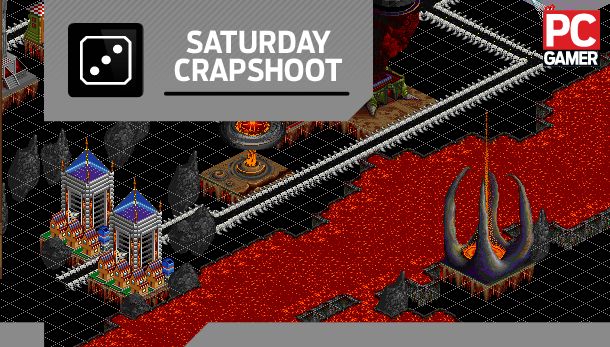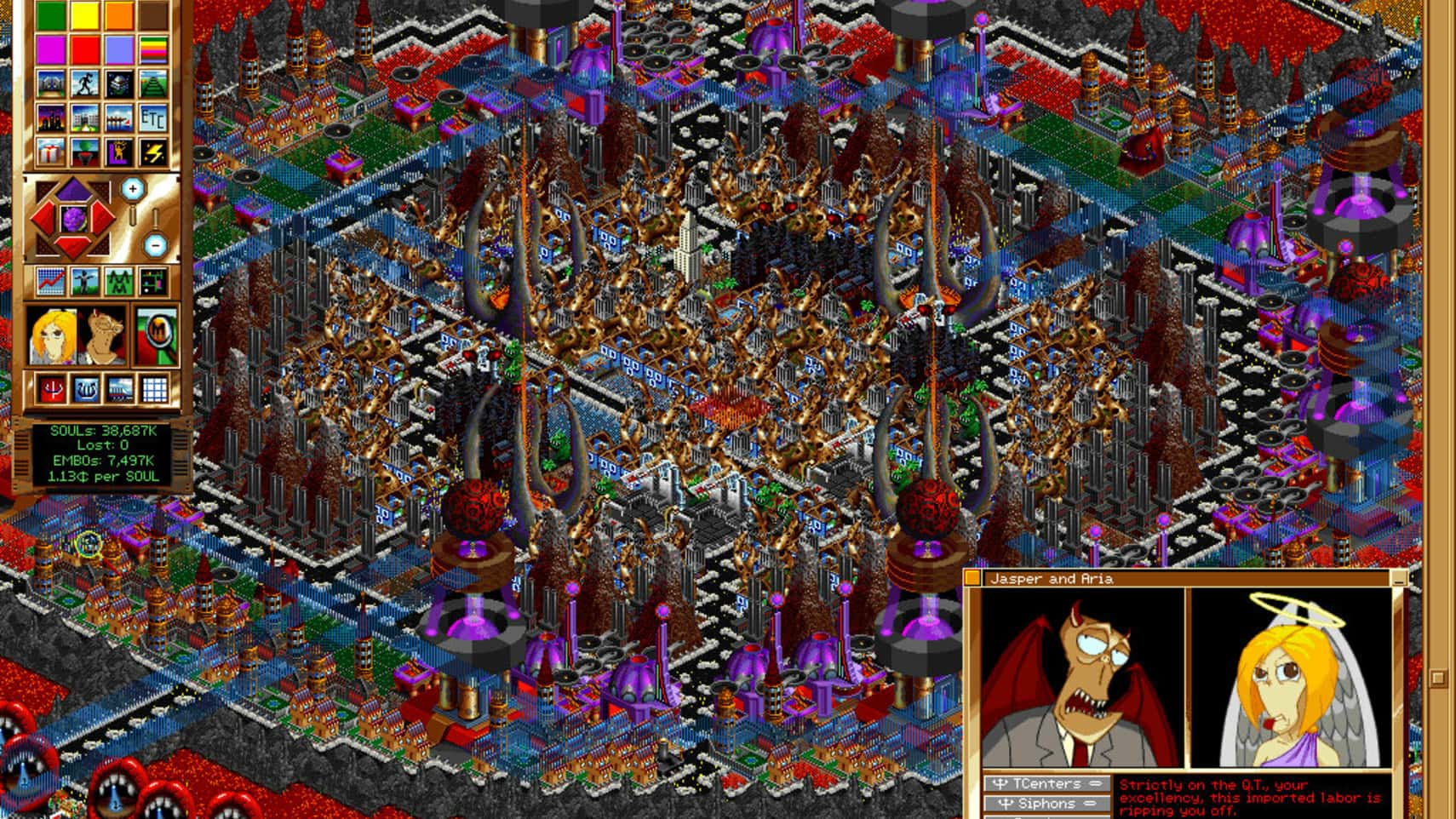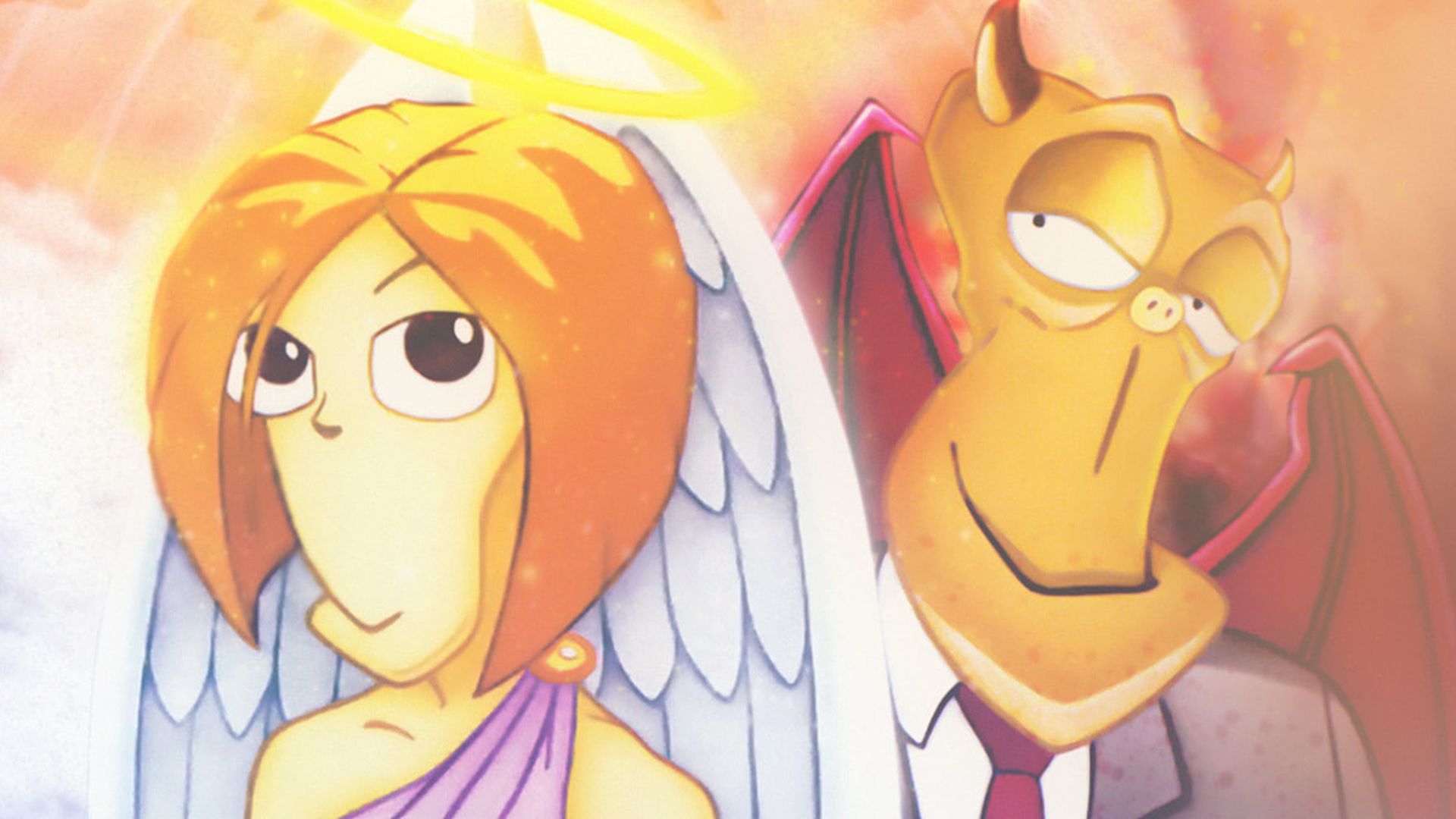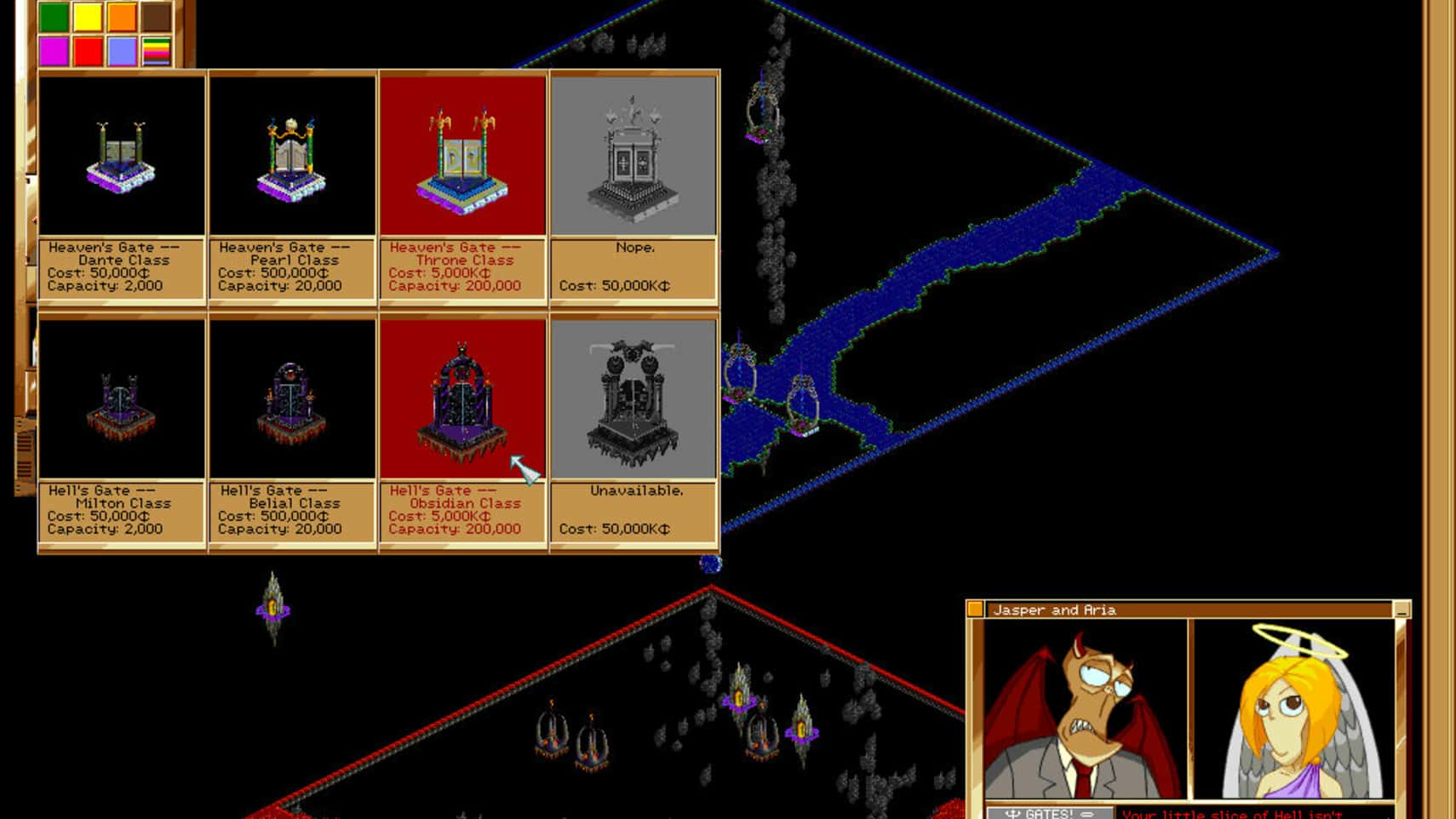Afterlife, the 'Sim Hell' game by LucasArts, was a sadly wasted opportunity
We're rerunning Richard Cobbett's classic Crapshoot column, in which he rolled the dice and took a chance on obscure games—both good and bad.

From 2010 to 2014 Richard Cobbett wrote Crapshoot, a column about rolling the dice to bring random games back into the light. This week, when you get to Hell, tell 'em this game sent you. 'Em is probably middle management. Overworked middle management. Who are suffering more.
The strangest thing about Afterlife is that nobody else has done it. At least, not really. The whole appeal of the god game is giving us, well, god-like power over a world, so it seems an easy jump from there to the likes of Sim Hell. Sim Heaven? Well, that doesn't quite have the same kick. But in the mid-90s, LucasArts—yes, them—not only realised the obvious potential, but figured, "What the... heck! We'll let you look after both of them at once." The second strangest thing about Afterlife is how much it didn't work. At all.
Yes, sadly Afterlife is part of a special genre of strategy games best described as "Should have been way more fun." Bullfrog's Gene Wars is another member, taking the idea of both creating unique creatures and fighting a war under the facade of making peace (on pain of being zapped by angry aliens), and turning it into a game with less a difficulty curve as a difficulty anal spike. Now I think about it, pretty much every game that wanted to mix genetic manipulation with strategy is a member of the club. Pity. The idea still has promise.
Afterlife's big mistake—though a reasonable decision, given the time—was to take the idea of being a Demiurge in charge of Heaven and Hell, and then completely, utterly wuss out. When you imagine Sim Hell, chances are you think of an awesomely dark humoured world of ironic punishments and hilariously sick jokes more along the lines of, well, the virtual reality bits of Hell. A damned soul would come in and face their eternal fate, whether being locked forever in a dentist's chair for serious infractions, such as creating Myst, or being pied in the face for all eternity for something minor, like, say, being a world champion at puppy bowling.
You want to be the Satan of Old Harry's Game, really, in a game that's gloriously over the top and probably described by the marketing guy as "A Hell of a Good Time", though not of course, the one awaiting them. Probably involving both the dentist chair and the eternity of pies.
It shouldn't however come as a surprise that LucasArts was never going to be the company that made that game. So instead, Afterlife goes further afield to the point that it can't even see the field, with your dominion not being over humanity in all its oily, sweaty glory, but a bunch of alien monster types about whom nobody cares. These are simply known as "EMBOs", which stands for "Ethically Mature Biological Organisms", and already Afterlife's grip on fun is as thin as a molecular wafer drizzled in chocolate.
To be fair, it's an endearingly quirky game, as you'd expect from a strategy game made by Mike Stemmle, whose credits include Sam & Max: Hit the Road, Escape From Monkey Island, and Tales from the Borderlands. Where SimCity had disasters like earthquakes and volcanos, Heaven and Hell can be set upon by the likes of Heaven's Nose, which snorts up anything in sight, and Bats Out of Hell, which coat everything in guano and actually help improve the tone by a bit.
Keep up to date with the most important stories and the best deals, as picked by the PC Gamer team.
The bulk of the game though is spent much like you'd spend SimCity: zoning. Each of the Seven Deadly Sins and its more morally upright opposite for Heaven are assigned a colour, and when you're told you need more of one colour, it really doesn't matter if it signifies Wrath or Charity. You just paint it down, or generic "whatever" zoning, and back it up with a handful of dedicated buildings that you can only buy if your little afterlife enterprise gathers enough Pennies From Heaven to pay the bills. In practical terms, this means that both Heaven and Hell soon start to look like an ungodly mess, and at best that's only appropriate half the time

Factor in that you also have to worry about factors like the state of the planet itself, as well as two separate afterlives, and the true hell here becomes one of micromanagement. It's so fiddly to keep everything in balance that after a while it starts feeling pointless to, and unlike SimCity, you don't get to build anything cool enough to really enjoy watching it get ripped apart when you do.
Things are made more confused by the weird desire to avoid anyone thinking that a game called Afterlife, in which you control Heaven and Hell with the help of an angel and a devil and everyone is judged and punished according to Christian theology, might be in any way a religious game. As such, you might look up a soul in Hell and find out that they've lived a great life, but have been consigned there temporarily because they believe in—deep breath—HOHORALFSUMAism.
"What the shit is that?" I hear you ask. And with cause! Well, instead of using regular terms, Afterlife prefers to break its Souls down like this:
- NAAAists: No Afterlife At All
- AAAAists: Absolutely Always An Afterlife
- HAHAists: Heaven AND Hell Await
- HOHOists: Heaven Or Hell Only
- OCRAists: Only Cloud Realms Await
- OPRAists: Only Pit Realms Await
- SUMAists: Souls Undergo Multiple Afterlives
- SUSAists: SOULs Undergo Singular Afterlives.
- ALFists: Afterlife Lasts Forever
- RALFists: Reincarnation Always Loops Fate.
Urrrrrrgh. Talk about turning 'trying too hard' into an artform.

The result is a game that goes from "Ooooooh!" to "Oh" faster than you can wish you were just playing SimCity. It doesn't help that it's a brutally hard and unforgiving game, which is admittedly appropriate for the Hell side, but with not much to do once everything is finally ticking along. Much like SimCity had its Arcologies as an effective "You've won, now go and get a life before you turn into this" ending, Afterlife has buildings like the Omnibolge that essentially do your work for you and leave you scouring the Want adverts for jobs where having created an infernal abyss of horror and torment that leaves all who witness it screaming and wailing to their non-existent god is considered ideal past work experience. Managing the Milton Keynes Planning Office, for instance.
Fail though, and failure is quite likely, and at least Afterlife has some entertaining ways to turn the world into rubble. There's no Godzilla, but it is possible for the planet to simply die out and leave you with no more fresh meat for the grille/fresh meat for the nicer grille, as well as start a war between the two sides that's bad for the cosmos, but most importantly, bad for business. Or you can simply get a visit from the Four Surfers of the Apocalypse, because in case you forgot, THIS WAS A '90S GAME.
Oh, what did that mean? Well, that meant it was both radical AND cowabunga. Dude. And cowabunga isn't even an adjective! Because it didn't have to be! It was the '90s! A time of Zs where they shouldn't be, and language that DID! NOT! CARE! Goodness, am I glad that they're over.

What it did do well, at least long enough for the demo to provide some fun, was fill in the details with the familiar LucasArts wit and style, including going into graphic detail on what all the hellish buildings were doing on the inside, and why it was a bad idea to try swimming in Hell's rivers. (In summary, they're Hell's rivers. Duh.) Gluttonous souls might be subjected to the Bowels of Hell, which even the narrator can't get through without being sick, involving the guts of an Archdemon, feeding tubes rammed down their mouths, and the other end going straight into the anus of the next guy in line.
Yes, LucasArts invented the Human Centipede. That is a thing that happened. But THAT's never brought up when people are arguing over whether or not they do, in fact, fight like a cow, is it? Tsk.
Another punishment is simply called "Out Of The Frying Pan", consisting literally of a floating pan over an inferno and described thusly:
June 23rd. Frying pan hotter than I remember. Going to jump. Maybe fire will be cooler this time.
June 24th. I was wrong. Demons laughed as my hair ignited. I'll never make THAT mistake again.
June 25th. Demons have put me back in the pan. It's hotter than I remember. Maybe I should jump...
And then there's their cinema.
Remember that scene in A Clockwork Orange where Malcolm McDowell was being forced to watch a seemingly neverending series of violent and pointless movies? This is infinitely worse. And the popcorn sucks.
Hehe. The creativity in terms of the torments isn't bad, though there's no visceral sadistic amusement to be had at cartoon creatures in off-screen pain... and when that's out, let's face it, nobody is going to play a game where they get to run Hell for the financial challenge of balancing the books. The actual game unfortunately just ends up with all this stuff being, well, buildings. Bad things may well go on inside, but buildings are still pretty dull. Even buildings that change into robots. Like in Big.
And that's Afterlife's biggest frustration. It's a game of things that described, can sound funny or interesting or endearingly creative, trapped in little more than a clone of SimCity 2000. It's one of LucasArts' least-remembered games for a reason, being neither good nor bad, but a definite wasted opportunity. It wasn't even their most diabolical game of the time. How could it be, when just across the hall the makers of Mortimer and the Riddles of the Medallion were writing songs that would never escape their player's head? That's true evil. The devil would approve. (And definitely signed off on its final level.)
But if someone ever feels like trying to make a SimHell game again... let's face it, you know we'd all play it.

